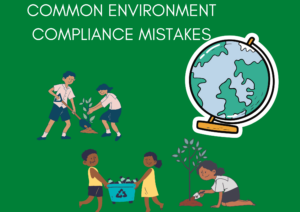Have you ever wondered what happens to all the peels, shells, pulp, wastewater, and leftovers after food is processed in factories? From maize milling and juice making to meat processing and packaging, Kenya’s food industry produces massive amounts of waste every single day.
But here’s the thing, not all of it is “waste.” In fact, most of it can be reused, repurposed, or recycled to create value, generate income, and protect our environment.
If you own or work in a food processing business or you’re thinking of starting one, this post will help you understand the kinds of waste food factories generate, how to handle and dispose of it properly, and how to fit into Kenya’s circular economy model. Find more posts on environmental laws, sustainability, waste management and everything in between here.
Why Waste in the Food Industry Matters
Food processing industries play a major role in Kenya’s economy, from dairy and grain mills to fruit juice and meat plants. But behind the delicious products we love lies a big environmental challenge: waste.
Think of all the maize husks, potato peels, fruit pulp, wastewater, plastic packaging, and expired goods. When not handled well, these materials rot in landfills, produce methane (a greenhouse gas), clog rivers, or attract pests.
Kenya’s environmental laws are getting stricter, and businesses are now expected to take full responsibility for how they manage their waste. Under the Sustainable Waste Management Act (2022) and the Extended Producer Responsibility (EPR) Regulations , every company , no matter how small, is required to reduce, reuse, recycle, and properly dispose of their waste.
The good news? With a little innovation, your factory can cut waste, save money, and even turn by-products into new business opportunities.
Table of Contents
Types of Waste Generated in the Food Processing Industry
Food industry waste comes from almost every stage, from raw material cleaning to final packaging. Let’s break it down:
1. Organic (Biodegradable) Waste
This is the biggest category. It includes:
- Fruit and vegetable peels
- Seeds, pulp, and shells
- Leftover or rejected food batches
- Expired or spoiled products
- Meat, fish, and bone remains
Example: A juice processing plant in Thika can use its leftover fruit pulp to make animal feed or organic compost instead of dumping it.
2. Wastewater (Effluent)
Food factories use a lot of water for washing, boiling, cooling, and cleaning. The leftover water often contains oil, fat, starch, and chemicals like detergents or disinfectants.
Regulation: The Water Quality Regulations, 2006 ,enforced by NEMA require every factory to treat its wastewater before releasing it into the environment. And if you tret waste water, you will need to apply for an effluent discharge license and do water analysis that should be attached when applying for the license.
Solution: Install an Effluent Treatment Plant (ETP) or partner with a shared one nearby. Treated water can be reused for cleaning, irrigation, or even cooling processes.
3. Packaging Waste
This includes:
- Plastic bottles, films, and wrappers
- Glass containers
- Cardboard boxes and paper labels
- Metal cans and caps
These materials don’t just disappear and most of them can be recycled or reused.
Example: A yogurt company can partner with recyclers to collect and reuse plastic cups, or switch to biodegradable packaging.
4. Chemical and Hazardous Waste
Even though food factories deal mostly with organic matter, they also use cleaning agents, oils, preservatives, and lab chemicals. These are considered hazardous waste.
Regulation: Under the Waste ManagementR egulations, 2006, these must be stored safely and disposed of by licensed waste handlers approved by NEMA.
Tip: Keep Material Safety Data Sheets (MSDS) for all chemicals and maintain records of disposal.
5. Energy Waste and Emissions
Old boilers, inefficient refrigeration, and fuel combustion produce emissions and waste heat. These not only harm the environment but also increase operational costs.
Solution: Switch to energy-efficient systems, biogas, or solar power, all encouraged under Kenya’s Climate Change Act (2016) and National Climate Change Action Plan (NCCAP).
What the Law Says in Simple Terms
If you run a food processing business in Kenya, here are the key policies and regulations you should know:
1. Environmental Management and Coordination Act (EMCA, 1999)
The foundation of all environmental regulation in Kenya. It mandates responsible waste management, environmental audits, and pollution control.
2. Sustainable Waste Management Act (2022)
Encourages industries to adopt circular economy principles, meaning waste should be seen as a resource, not just garbage.
3. Extended Producer Responsibility (EPR) Regulations 2024
Producers, importers, and manufacturers must take responsibility for their products’ entire life cycle, from design to disposal.
For food companies, this means managing packaging, expired goods, and by-products sustainably.
4. Water Quality and Waste Management Regulations (2006)
You must treat wastewater and properly handle solid and hazardous waste.
5. Occupational Safety and Health Act (OSHA, 2007)
Ensures waste handling doesn’t endanger workers, a key part of sustainability.
How to Dispose of Food Processing Waste Properly
Let’s get practical. Here’s how to handle each waste type responsibly:
Organic Waste
- Composting: Turn peels, pulp, and spoiled food into organic fertilizer.
- Animal feed: Dry and process fruit pulp, grain husks, or peels for livestock.
- Biogas: Convert waste into renewable energy for cooking or factory use.
- Avoid dumping: It’s illegal to dump untreated organic waste in open areas.
Wastewater
- Install an ETP: Filters out solids, oils, and chemicals before discharge.
- Reuse treated water: For irrigation or cleaning factory floors.
- Monitor discharge: NEMA requires regular sampling and reporting.
Packaging Waste
- Reduce: Use lightweight or biodegradable packaging.
- Reuse: Encourage container returns or refills.
- Recycle: Partner with recyclers
- Label: Mark packages with recycling symbols and instructions.
Chemical Waste
- Store safely: Keep in labeled containers, away from drains.
- Use licensed handlers: Only NEMA-approved firms can dispose of hazardous waste.
- Train staff: Everyone should know how to handle spills safely.
Turning Food Waste Into New Value, The Circular Way
Circular economy thinking means waste from one process becomes input for another. For food processing, this is where things get exciting.
Here’s how you can do it:
1. Upcycle Organic Waste
- Fruit pulp → animal feed or fruit leather snacks
- Maize husks → briquettes or compost
- Coffee husks → fertilizer
- Meat and bone waste → pet food or bone meal
2. Recover Energy
- Install biogas digesters to turn organic waste into clean fuel.
- Reuse waste heat from boilers to preheat water.
3. Recycling and Reuse
- Partner with packaging recyclers for plastics, glass, and metal.
- Switch to refill systems where customers return containers.
4. Collaborate Locally
- Work with local farmers for compost distribution.
- Partner with community-based recyclers or youth waste enterprises.
Why It’s Good for Business
Sustainability isn’t just about being “green”, it’s smart business.
✅ Cut costs: Reuse water, sell by-products, and save on disposal fees.
✅ Earn more: Sell compost, animal feed, or briquettes made from waste.
✅ Build trust: Consumers prefer eco-friendly brands.
✅ Stay compliant: Avoid NEMA fines and license issues.
✅ Attract funding: Investors love sustainable businesses.
How to Stay Compliant Without Stress
Here’s a quick checklist:
- Do a waste audit — identify what you throw away.
- Register with NEMA and get your waste management plan approved.
- Separate waste at the source; organic, plastic, paper, and chemical.
- Keep records of waste volumes and disposal receipts.
- Train your staff on handling and recycling waste.
- Join or form a Producer Responsibility Organization (PRO) to manage waste collectively.
Common Mistakes (and How to Avoid Them)
🚫 Mixing all waste together — makes recycling impossible.
🚫 Burning or dumping waste — illegal and harmful.
🚫 Ignoring wastewater — leads to NEMA penalties.
🚫 Failing to document waste — shows non-compliance during audits.
Solution: Keep it simple; separate, record, and recycle.
Easy Wins You Can Try This Month
- Start composting your food waste.
- Install a small biogas unit for kitchen or boiler use.
- Replace plastic wrapping with paper or biodegradable alternatives.
- Partner with recyclers for your plastic or glass packaging.
- Offer customers incentives to return empty containers.
Where to Learn More
- NEMA Kenya: www.nema.go.ke — EPR and licensing updates
- Sustainable Waste Management Act (2022) — Ministry of Environment
Final Thoughts: Feeding Kenya Without Wasting It
The food processing industry is one of Kenya’s biggest job creators, but also one of the biggest waste producers. The future belongs to businesses that turn waste into value, comply with environmental laws, and operate responsibly.
Every peel, pulp, and package counts. What you throw away today could be your next income stream tomorrow.
So, whether you’re a juice processor in Thika, a flour miller in Eldoret, or a dairy company in Nyeri, start small: sort your waste, treat your water, and look for ways to reuse what you once considered “waste.”
And if you need help figuring out where to start, from understanding your waste streams, setting up circular systems, or registering for EPR and NEMA compliance, I can help.
As an environmental consultant, I work with Kenyan food businesses to:
- Conduct waste and water audits
- Support NEMA licensing and compliance
- Develop sustainable waste management plans
- Help register under EPR regulations
- Design circular systems that save money and protect the planet
📩 Email me at valeriekinoti@gmail.com, let’s work together to make Kenya’s food industry cleaner, smarter, and sustainable for generations to come.


